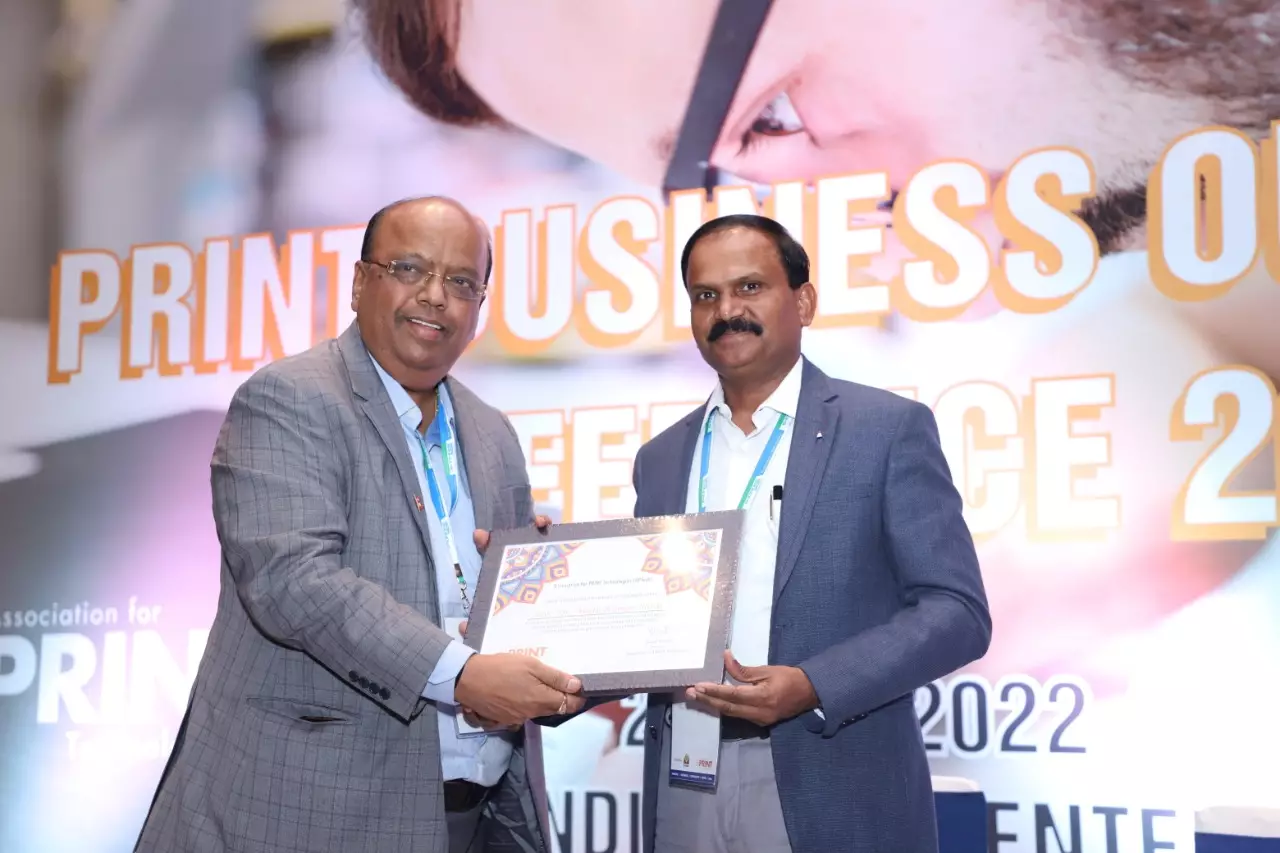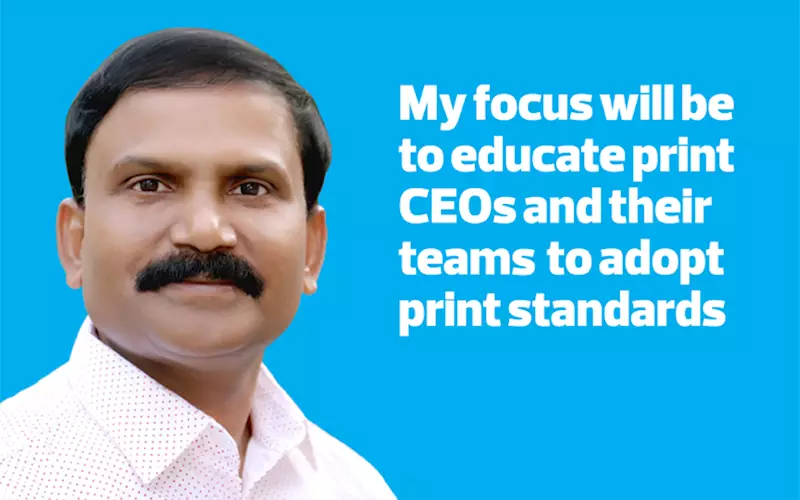My focus will be to educate print CEOs and their teams to adopt print standards - The Noel D'Cunha Sunday Column
Prof Dr Anjan Kumar Baral of department of printing technology, Guru Jambeshwar University of Science and Technology, was recently assigned to the Bureau of Indian Standards. In this exclusive interview with PrintWeek, Baral explains his new role, the BIS activities, and its plans for the printing industry
05 Jun 2022 | By Noel D'Cunha
PrintWeek (PW): Congratulations Prof Dr Anjan Kumar Baral. What does your new job entail?
Anjan Kumar Baral (AKB): Thank you for your wishes. As the chairman of publications and graphic technology, sectional committee, MSD 6, Management and Systems Development Council (MSDC), Bureau of Indian Standards (BIS), my role is to guide all the facets of the technical activity assigned to the committee from time to time relating to printing standards.
PW: How different will the job be from your previous engagement as a teacher?
AKB: Teaching is about inspiring and motivating students to realise and exceed their potential. I am proud to be a print teacher. My present assignment will help me contribute at the national level. This is something closer to my heart. I believe my present assignment will benefit the teaching and research community, along with the printing industry, for its growth and development, in terms of developing, adopting and validating print standards.
PW: How can you help the printing community about the BIS standards from your new engagement?
AKB: Indian printing industry is one of the largest (in terms of number of presses) in the world. It is a growth industry. The print-packaging applications, especially, have a bright future. That said, the majority of the printing units in India are either small or medium businesses. My focus will be educating printers in terms of adopting printing standards. These are basic standards, and it will help them enhance their productivity and the quality of their work. At the same time, my job would also involve motivating large printing establishments to utilise the potential benefits of printing standards. We would also like to involve them in developing new standards.
PW: Has the Covid scenario led you to any alterations in BIS regulations for the print and publishing?
AKB: I have just taken over the charge of MSD 6. I had a meeting with the esteemed members of the sectional committee, and we tried to figure out various steps to be taken into account on priority basis. To tide over the crisis due to Covid, BIS has provided concessions in the marking fee for certification to the industry in the form of a certain percentage of fee waived off, relaxation in fee payment timeline, etc. As the raw material cost in the printing and publishing houses are increasing day by day, and customers are focusing on quality aspects, soon we will develop innovative practices to be followed by the print and publishing industry, to cope up with post-Covid effects.
PW: What are the certifications issued by BIS that have emerged in the past 18-20 months? What is the best way to apply for these certificates?
AKB: Every day, new products are added to the BIS certification scheme for licence in various fields, including, inks, papers, etc. Application for BIS certification is an online process and can be done through website manakonline.in.
PW: How have the consumer preferences changed? How are brands adapting to the changes suggested by FSSAI and BIS? To what extent will it impact design and brand messaging?
AKB: Today’s consumers are entirely unrecognisable from their peers in the good old days. In recent times, readers in general appreciate audio, interactive text, moving images/graphics, visualisation and authentic data. Under the circumstances, it makes sense for the publication industry that they put extra efforts in building relationships with their prospective readers.
BIS primarily deals with setting up standards and providing certification to goods that are imperative to public health and safety, whereas FSSAI is primarily concerned with setting up guidelines and implementing them for food safety. BIS has been recognised by FSSAI as a Food Safety Auditing Agency as per Food Safety and Standards (Food Safety Auditing) Regulations, 2018. From time to time, BIS and FSSAI work together for the betterment of the printing and the food industry in India.
There is a greater awareness among consumers about ISI-marked products. This, in turn, has resulted in more and more brands opting for BIS licence and promoting their products, conforming to Indian Standards with ISI mark.

(l-r) Manoj Mehta and Anjan Baral at Infinite Print 2022
PW: Our team saw glimpses of BIS participation in the India International Dairy Expo held at Mumbai. The point is, BIS is promoting Standard Mark Certification of Milk and Milk Products through this forum. How does one keep pace with these BIS development cycles? Which are the important forums?
AKB: BIS involves different stakeholders — consumer organisations, industry, regulatory bodies, academia, R&D institutions — in the BIS Standard formulation process. Individuals can also comment on the draft standards which are circulated for consideration. BIS promotes its standards through various forums, such as industry meet, webinars, lecture series in universities, colleges and schools, Standards club in schools, awareness creation among self-help groups, and so on.
PW: BIS organised an awareness and implementation webinar on Indian Standards on plastic packaging for edible products on 28 March 2022. Which are the webinars for print, publishing and packaging in April and May?
AKB: BIS organises webinars on topics relevant to the industry, consumers, etc. No webinars are planned for printing, publishing and packaging as of now. We are planning to conduct webinars for the printing, publishing and packaging industry in the coming months, to benefit students, researchers and the industry personnel.
PW: Your thoughts on sustainability? Any green substrate in recent times that you adopted? Any tweak in the process that you employed to mitigate wastage?
AKB: We all have a moral obligation towards the Earth, especially to each other, for our future generations and for all living creatures, for a better place to live and prosper. What we do today certainly has a huge impact on our future generations. Sustainability is the key to a better future. To reduce environmental footprint, in recent times, sustainable printing methods are getting attention. The credit goes to the technological advancements that have been taking place in this sector.
Carbon-balanced paper being printed on a carbon-balanced printer, in my view, is one of the right choices for taking care of sustainable print. Uncoated paper is an innovative printing method that has incredible results on the LED UV press. Uncoated paper is a highly fibrous material that is lighter than coated paper varieties. Because of this, it’s widely accepted by many mills for recycling and is easy to transport.
Adopting right and effective workflow management systems, production process, with continuous monitoring, along with conducting training to the print technicians, will help reduce and minimise print wastage at printing and packaging establishments. Adherence to the standards available is the right answer for minimising wastage in any industry.
PW: Of the various shifts that you witnessed in these 24 months, do you see any of them becoming permanent? What are the new standardisations for our industry which are “a must”?
AKB: The Covid-19 pandemic has certainly changed the world, and its effect on the printing and publishing industry cannot be overlooked, especially in the last two years. This year will be a year of transition. One has to look forward, analyse and plan effectively for the next normal and to deal with the future.
The printing and publishing industry is in constant change. At present, we all are passing through a bad phase. But there is always a silver lining in the dark cloud. The trend toward digital printing and publishing continues to grow and succeed. One should be prepared for the same, in order to sustain, grow and develop.
Presently, MSD 6 is planning to develop standards in the areas such as process-free/process-less plates, digital print standards and sustainable printing substrates, etc, to benefit the printing and publishing industry at large.











 See All
See All